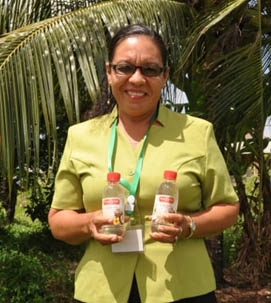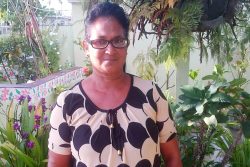One of the Pomeroon’s best-known female farmers, Rosemund Benn, has found her entrepreneurial calling in the manufacturing sector. She resides at Grant Wilde where she trades under the name ‘Pomeroon Rose.’ Her roots, however, are in Moruca.
Established in 2017, Pomeroon Rose may have made its name largely from virgin coconut oil. The brand, however, goes beyond a single product. Coconut, casareep, pepper sauce, and coconut water also bear the same trading name.
Over time, aggressive marketing has won Pomeroon Rose’s Virgin Coconut Oil, distribution outlets through the Charity Market, The Guyana Shop in Georgetown, and at various other outlets in Moruca, Bartica, and in Suriname. Rosemund’s products also benefit from distribution outlets afforded by the Women’s Agro Processors Development Network (WADN), a registered Friendly Society comprising seven women-run agro-processing enterprises located in Regions One, Two and Nine.
This week, it was Rosemund’s turn to be interviewed by the Stabroek Business about how local micro and small businesses are faring in the ‘season’ of COVID-19. Her’s is a story of tough times but a steely will to survive.
Sales have plunged by close to 90%, she says. Like so many other agro-processors who the Stabroek Business has interviewed over the past several weeks, she says that the reduced intake of product into the Guyana Marketing Corporation’s Guyana Shop has struck at the heart of her distribution arrangements. WADN’s closure of its distribution service to the public has further affected Pomeroon Rose’s market. Charity Market, too, has, in recent months, given the coronavirus restrictions, been a shadow of its former self.
The company now produces around twenty gallons of coconut oil monthly as against the sixty gallons that it produced prior to the arrival of the pandemic. That has had a knock-on effect on her enterprise. Her coconut cultivation is directly linked to the production of coconut oil, reduced demand for which now means that she must now find alternative ways of marketing her coconuts. Again as with so many other entrepreneurs operating small and medium-sized businesses, Rosemund has had to let her employees (three in this instance) go.
Two Mondays ago, Rosemund says, trading at the Charity Market was brisker than it had been for months. While her takings were well below what they customarily were, she noted the fact that there had been a pleasing increase in commercial traffic compared with several earlier weeks. The vendors from Moruca whose fortunes depend heavily on the Charity Market had begun to find their way to the market in numbers following a protracted lockdown. The losses during that period of lockdown, she says, would have been considerable. Since February ‘Pomeroon’ Rose hasn’t sold ‘a dime’ to a customer in either Linden or Suriname.
For Rosemund and her family, the COVID-19 challenges do not end there. Reduced demand for farm produce has meant that their four-acre family farm has also been affected. These days their farming pursuits are confined to one acre. Still, spoilage and dumping are commonplace. Ever rising costs associated with moving product from the Pomeroon to Georgetown do not help either.
Like the vast majority of small and medium scale operators in the agriculture and agro-processing sector, however, for Rosemund Benn failure is not an option. Recovery for these types of businesses that generate hundreds of jobs across communities will be critical to the overall resuscitation of an economy that has already been notably discommoded by COVID-19. Rosemund is awaiting what she hopes will be the disappearance of the pandemic, sooner rather than later, to introduce new products to the market. Research and trials, she says, could create delays but she is already set on that course. One of those products which she intends to probe for its commercial potential is what she says is a ‘backyard remedy’ for insect bites. Trials have already been done on various members of her family.
Reflecting on her years in agriculture and agro-processing Rose recalls that she and her husband, Randolph began cultivating sweet potato on what, at the time, was a newly acquired 25-acre farm. In those days, restrictions on the importation of wheaten flour made sweet potato (flour) a fast-selling product. They switched to cash crops in 1985 after the importation of wheaten flour was restarted. Simultaneously they developed a coconut grove and began marketing dried coconuts and copra. Coconut oil production derived from the ‘excess’ coconuts and the Pomeroon Women’s Agro Processors Association became one of her earliest markets.
The Association itself – of which she was to become a leading member – derived from a decision made by the women of the community to, simultaneously, turn to fruit-processing in order to recover the volumes of fruit that were spoiling as well as to create employment in their community.
Virgin Coconut Oil was introduced to Rosamund in 2007. Last December she lost her market for Virgin Coconut Oil in Antigua. She continues to be constrained by her modest operations on account of which her production level is limited to forty-five gallons every six weeks. Equipment acquisition and factory expansion plans have been stymied by the advent of COVID-19.
Those constraints apart, the family has also had to deal with red termite infestation. For all this, Pomeroon Rose is keen to leave the impression that she is in business for the long haul.










